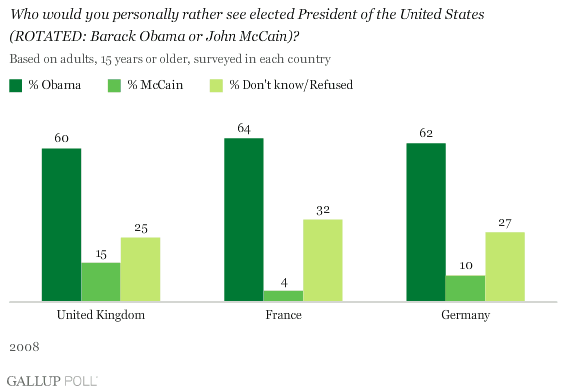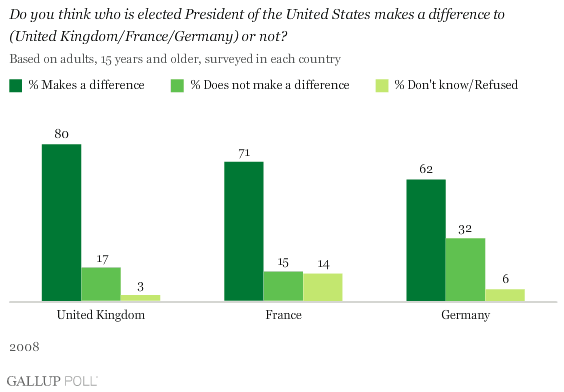WASHINGTON, D.C. -- Substantial majorities of citizens of France, Germany, and the United Kingdom say that they would like to see Democratic Sen. Barack Obama rather than Republican Sen. John McCain elected U.S. president, and also that it makes a difference to their country who is elected.


Obama, with a small group of other senators, visited Afghanistan and Iraq this week as part of an official congressional fact-finding mission, and he is now set to visit with the leaders of the United Kingdom, Germany, and France as he moves into a campaign-oriented segment of his overseas trip.
If the choice of U.S. president were up to citizens of these countries, Obama would defeat McCain in a landslide. Even with relatively high no opinion percentages in each country (ranging from 25% to 32%), solid majorities of residents in the United Kingdom, France, and Germany would rather see Obama than McCain elected U.S. president this fall. The majorities that favor Obama in these countries compare with a small advantage Obama currently holds in Gallup Poll's U.S. Daily tracking.
It is also clear that the residents of these European countries have more than a passing interest in the U.S. election. A solid majority in each say that the results of the November election in the United States will make a difference in their country.
In each of these countries, Gallup recorded in 2007 abysmally low approval of U.S. leadership -- just 8% approval in Germany, 9% in France, and 20% in the United Kingdom. Much of this likely stems from opposition to the U.S.-led Iraq war, but it could also result from U.S. policy on global warming or reported human rights abuses in Guantanamo Bay.
Obama's current strength in these countries may be an outcome of the early publicity surrounding his nomination, particularly the fascinating and dramatic primary contest between Obama and the well-known Sen. Hillary Clinton. As a result, during much of the spring McCain was not the subject of nearly the international media attention that Obama was. It is possible, therefore, that McCain could gain some as the visibility of the two U.S. presidential candidates in the worldwide media becomes more equal throughout the next three months. Still, there is no question that Obama has become a "rock star" of sorts in these countries, and whether it is simple name recognition or an awareness of and agreement with his policy positions, he is clearly the favorite at this point.
Implications
These results suggest that residents of these three major European nations will likely pay attention to the outcome of the U.S. election. Given their strongly favorable views of Obama, his election could go a long way toward restoring U.S. prestige in Europe. That is not to say McCain could not also improve the United States' image -- given the low regard in which Europeans hold U.S. leadership, they would likely welcome almost any change. However, Europeans seem positively disposed to the Democratic presidential nominee at this point, and he might not need to work as hard to earn their favor as McCain would, if he maintains his positive image through November.
The Obama campaign at the same time recognizes some risk to his being so widely adored in Europe, which some Americans may not view as a plus, although Gallup's 2008 update on the images of the United Kingdom, France, and Germany shows that a significant majority of Americans now has a favorable image of each.
Gallup is polling citizens of more than 70 countries about their views on the U.S. election and will continue to report the results on Gallup.com.
Survey Methods
Results are based on telephone interviews with randomly selected samples of adults, aged 15 and older, conducted May 20-June 24, 2008, in Germany, June 5-20, 2008, in France, and June 4-24, 2008, in the United Kingdom. This includes interviews with 1,011 adults in Germany, 1,006 adults in France, and 1,001 adults in the United Kingdom.
For results based on each of these samples of national adults, one can say with 95% confidence that the maximum margin of sampling error is ±3 percentage points. In addition to sampling error, question wording and practical difficulties in conducting surveys can introduce error or bias into the findings of public opinion polls.
